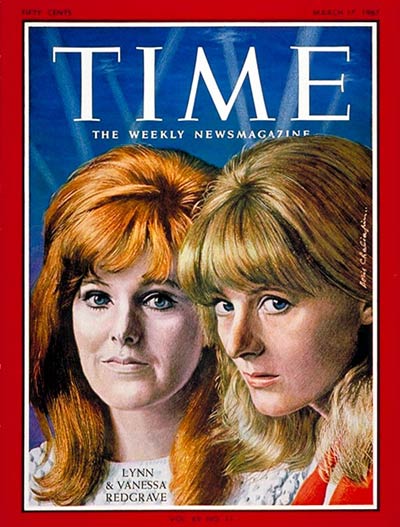
Milestone moments do not a year make. Often, it’s the smaller news stories that add up, gradually, to big history. With that in mind, in 2017 TIME History will revisit the entire year of 1967, week by week, as it was reported in the pages of TIME. Catch up on last week’s installment here.
A new name was lighting up the mental marquees of culture watchers in early 1967: Redgrave. Well, actually, it wasn’t new at all — Sir Michael Redgrave was already one of England’s most respected thespians, and his wife Rachel had a career of her own — but it was much more visible. The two Redgrave daughters had crossed the pond and gone Hollywood, introducing larger audiences to theatrical talents that had been limited to those with access to London’s theaters. (Their brother Corin was just getting into the business as well.)
The year 1966 had seen the comedic chops of the “madcap mimic” Lynn, then 24, on display in Georgy Girl and a “sense of mystery and radiance in her presence” leading Vanessa, 30, to shine as a leading lady in Morgan! and Blow-Up. Both were nominated for Best Actress at the upcoming Oscars.
But, as TIME explained in a cover story, Redgrave-mania was about more than two individual talents:
The rise of this remarkable sister act coincides with the emergence of a new international era in cinema and a new international species of film actor…
The new thrust in movies took inception from the collapse of Hollywood in the early ’50s and the revival of Europe as a center of film production. Since the European industry was small and loosely organized, such directors as Vittorio De Sica, Ingmar Bergman, Federico Fellini, Michelangelo Antonioni, Alain Resnais, François Truffaut and Jean-Luc Godard could pretty well shoot them as they saw them and let the censor take the hindmost. As a result, they made a number of fine far-out films (The Bicycle Thief, Wild Strawberries, 8 1⁄2, L’Avventura, Hiroshima, Mon Amour, The 400 Blows, Breathless) that made a startling amount of money.
U.S. producers were impressed. Unable to beat the new movement, they decided to join it. New Hollywoods, largely supported by U.S. capital, arose on the Seine and the Isar, the Tiber and the Thames. In 1966, every other movie made with American money was made abroad, and many of them (A Man for All Seasons, Blow-Up, Taming of the Shrew) were made by European directors and actors. Moreover, moviemaking at last fell out of the pockets of the moneymen in the front offices and into the hands of directors, writers and actors who suddenly found themselves with more freedom than they had ever known in the dear dead days that were happily beyond recall.
As for the Oscars, the awards provided no fodder for sibling rivalry: the prize went to Elizabeth Taylor for Who’s Afraid of Virginia Woolf?
Get your history fix in one place: sign up for the weekly TIME History newsletter
Two views on Vietnam: An article in the national news section neatly summed up the two prevailing, competing views on the War in Vietnam within the U.S. government. On one side, President Lyndon Johnson made the case to the world that the best way to get North Vietnam to the bargaining table for peace talks was to make it clear that, otherwise, military force used by the U.S. would only grow. On the other side were those championed by Sen. Robert Kennedy, who held that the way to convince the world to take peace seriously was to halt bombing. As LBJ and RFK faced off over the disagreement, the President was rumored to have told the Senator that the conversation was effectively over: “I never want to see you again,” he was reported to have said.
Jimmy in jail: Teamsters Union boss Jimmy Hoffa had just begun his time in jail, after a decade running the union—a decade full of success for the teamsters but near-constant legal battles for Hoffa, over “questionable associations with gangsters, shady deals with employers and flagrant misuse of union funds.”
Stalin surprise: In a shocking Cold War subplot, Josef Stalin’s daughter Svetlana, who had not been in the public eye for years, had suddenly reappeared—in an attempt to defect to the West. At a moment that was inconvenient for both the USSR and the U.S., she left her children in Moscow and made her way out of the country.
Health goal: The U.S. government announced the goal of eradicating measles by the end of the year. (Spoiler alert: they failed, and even the elimination of measles in the U.S. in the year 2000 wasn’t the end of the story, as the U.S. has seen hundreds of cases in recent years, including a much-publicized outbreak at Disneyland.)
Great vintage ad: This one, from Lockheed, is just plain weird.
Coming up next week: Martin Luther
More Must-Reads from TIME
- Inside Elon Musk’s War on Washington
- Meet the 2025 Women of the Year
- The Harsh Truth About Disability Inclusion
- Why Do More Young Adults Have Cancer?
- Colman Domingo Leads With Radical Love
- How to Get Better at Doing Things Alone
- Cecily Strong on Goober the Clown
- Column: The Rise of America’s Broligarchy
Write to Lily Rothman at lily.rothman@time.com